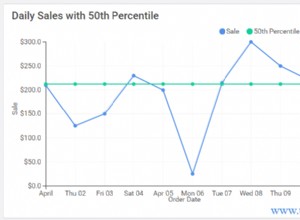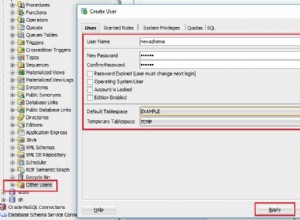Spróbuj tego:https://www.sqlfiddle.com/#!2/e9372/ 1
Zaletą robienia tego po stronie bazy danych jest to, że możesz użyć zapytania nie tylko w PHP, ale także w Javie, C#, Pythonie itp. I robi się to szybko po stronie bazy danych
select
if(idle_state = 1,
concat('Idle ', idle_count),
concat('NonIdle ', non_idle_count) ) as Period,
startTime, endTime, duration
from
(
select
@idle_count := @idle_count + if(idle_state = 1,1,0) as idle_count,
@non_idle_count := @non_idle_count +if(idle_state = 0,1,0) as non_idle_count,
state_group, idle_state,
min(timeStamp) as startTime, max(timeStamp) as endTime,
timestampdiff(second, min(timeStamp), max(timeStamp)) as duration
from
(
select *,
@idle_state := if(rpm between 800 and 900, 1, 0) as idle_state,
@state_group := @state_group +
if(@idle_state = @prev_state,0,1) as state_group,
@prev_state := @idle_state
from (tbl, (select @state_group := 0 as y) as vars)
order by tbl.timeStamp
) as x
,(select @idle_count := 0 as y, @non_idle_count := 0 as z) as vars
group by state_group, idle_state
) as summary
Wyjście:
| PERIOD | STARTTIME | ENDTIME | DURATION |
|-----------|----------------------------|----------------------------|----------|
| Idle 1 | May, 01 2012 01:02:56-0700 | May, 01 2012 01:05:55-0700 | 179 |
| NonIdle 1 | May, 01 2012 01:07:00-0700 | May, 01 2012 01:10:15-0700 | 195 |
| Idle 2 | May, 01 2012 01:11:20-0700 | May, 01 2012 01:14:20-0700 | 180 |
| NonIdle 2 | May, 01 2012 01:15:20-0700 | May, 01 2012 01:15:20-0700 | 0 |
Zobacz postęp zapytania tutaj:https://www.sqlfiddle.com/#!2 /e9372/1
Jak to działa:
Pięć kroków.
Najpierw oddziel bezczynność od nie bezczynności:
select *,
@idle_state := if(rpm between 800 and 900, 1, 0) as idle_state
from (tbl, (select @state_group := 0 as y) as vars)
order by tbl.timeStamp;
Wyjście:
| TIMESTAMP | RPM | Y | IDLE_STATE |
|----------------------------|------|---|------------|
| May, 01 2012 01:02:56-0700 | 802 | 0 | 1 |
| May, 01 2012 01:03:45-0700 | 845 | 0 | 1 |
| May, 01 2012 01:04:50-0700 | 825 | 0 | 1 |
| May, 01 2012 01:05:55-0700 | 810 | 0 | 1 |
| May, 01 2012 01:07:00-0700 | 1000 | 0 | 0 |
| May, 01 2012 01:08:03-0700 | 1005 | 0 | 0 |
| May, 01 2012 01:09:05-0700 | 1145 | 0 | 0 |
| May, 01 2012 01:10:15-0700 | 1110 | 0 | 0 |
| May, 01 2012 01:11:20-0700 | 800 | 0 | 1 |
| May, 01 2012 01:12:22-0700 | 812 | 0 | 1 |
| May, 01 2012 01:13:20-0700 | 820 | 0 | 1 |
| May, 01 2012 01:14:20-0700 | 820 | 0 | 1 |
| May, 01 2012 01:15:20-0700 | 1200 | 0 | 0 |
Po drugie, podziel zmiany na grupy:
select *,
@idle_state := if(rpm between 800 and 900, 1, 0) as idle_state,
@state_group := @state_group +
if(@idle_state = @prev_state,0,1) as state_group,
@prev_state := @idle_state
from (tbl, (select @state_group := 0 as y) as vars)
order by tbl.timeStamp;
Wyjście:
| TIMESTAMP | RPM | Y | IDLE_STATE | STATE_GROUP | @PREV_STATE := @IDLE_STATE |
|----------------------------|------|---|------------|-------------|----------------------------|
| May, 01 2012 01:02:56-0700 | 802 | 0 | 1 | 1 | 1 |
| May, 01 2012 01:03:45-0700 | 845 | 0 | 1 | 1 | 1 |
| May, 01 2012 01:04:50-0700 | 825 | 0 | 1 | 1 | 1 |
| May, 01 2012 01:05:55-0700 | 810 | 0 | 1 | 1 | 1 |
| May, 01 2012 01:07:00-0700 | 1000 | 0 | 0 | 2 | 0 |
| May, 01 2012 01:08:03-0700 | 1005 | 0 | 0 | 2 | 0 |
| May, 01 2012 01:09:05-0700 | 1145 | 0 | 0 | 2 | 0 |
| May, 01 2012 01:10:15-0700 | 1110 | 0 | 0 | 2 | 0 |
| May, 01 2012 01:11:20-0700 | 800 | 0 | 1 | 3 | 1 |
| May, 01 2012 01:12:22-0700 | 812 | 0 | 1 | 3 | 1 |
| May, 01 2012 01:13:20-0700 | 820 | 0 | 1 | 3 | 1 |
| May, 01 2012 01:14:20-0700 | 820 | 0 | 1 | 3 | 1 |
| May, 01 2012 01:15:20-0700 | 1200 | 0 | 0 | 4 | 0 |
Po trzecie, pogrupuj je i oblicz czas trwania:
select
state_group, idle_state,
min(timeStamp) as startTime, max(timeStamp) as endTime,
timestampdiff(second, min(timeStamp), max(timeStamp)) as duration
from
(
select *,
@idle_state := if(rpm between 800 and 900, 1, 0) as idle_state,
@state_group := @state_group +
if(@idle_state = @prev_state,0,1) as state_group,
@prev_state := @idle_state
from (tbl, (select @state_group := 0 as y) as vars)
order by tbl.timeStamp
) as x
group by state_group, idle_state;
Wyjście:
| STATE_GROUP | IDLE_STATE | STARTTIME | ENDTIME | DURATION |
|-------------|------------|----------------------------|----------------------------|----------|
| 1 | 1 | May, 01 2012 01:02:56-0700 | May, 01 2012 01:05:55-0700 | 179 |
| 2 | 0 | May, 01 2012 01:07:00-0700 | May, 01 2012 01:10:15-0700 | 195 |
| 3 | 1 | May, 01 2012 01:11:20-0700 | May, 01 2012 01:14:20-0700 | 180 |
| 4 | 0 | May, 01 2012 01:15:20-0700 | May, 01 2012 01:15:20-0700 | 0 |
Po czwarte, uzyskaj liczbę bezczynności i nie bezczynności:
select
@idle_count := @idle_count + if(idle_state = 1,1,0) as idle_count,
@non_idle_count := @non_idle_count + if(idle_state = 0,1,0) as non_idle_count,
state_group, idle_state,
min(timeStamp) as startTime, max(timeStamp) as endTime,
timestampdiff(second, min(timeStamp), max(timeStamp)) as duration
from
(
select *,
@idle_state := if(rpm between 800 and 900, 1, 0) as idle_state,
@state_group := @state_group +
if(@idle_state = @prev_state,0,1) as state_group,
@prev_state := @idle_state
from (tbl, (select @state_group := 0 as y) as vars)
order by tbl.timeStamp
) as x
,(select @idle_count := 0 as y, @non_idle_count := 0 as z) as vars
group by state_group, idle_state;
Wyjście:
| IDLE_COUNT | NON_IDLE_COUNT | STATE_GROUP | IDLE_STATE | STARTTIME | ENDTIME | DURATION |
|------------|----------------|-------------|------------|----------------------------|----------------------------|----------|
| 1 | 0 | 1 | 1 | May, 01 2012 01:02:56-0700 | May, 01 2012 01:05:55-0700 | 179 |
| 1 | 1 | 2 | 0 | May, 01 2012 01:07:00-0700 | May, 01 2012 01:10:15-0700 | 195 |
| 2 | 1 | 3 | 1 | May, 01 2012 01:11:20-0700 | May, 01 2012 01:14:20-0700 | 180 |
| 2 | 2 | 4 | 0 | May, 01 2012 01:15:20-0700 | May, 01 2012 01:15:20-0700 | 0 |
Na koniec usuń zmienne pomostowe:
select
if(idle_state = 1,
concat('Idle ', idle_count),
concat('NonIdle ', non_idle_count) ) as Period,
startTime, endTime, duration
from
(
select
@idle_count := @idle_count + if(idle_state = 1,1,0) as idle_count,
@non_idle_count := @non_idle_count +if(idle_state = 0,1,0) as non_idle_count,
state_group, idle_state,
min(timeStamp) as startTime, max(timeStamp) as endTime,
timestampdiff(second, min(timeStamp), max(timeStamp)) as duration
from
(
select *,
@idle_state := if(rpm between 800 and 900, 1, 0) as idle_state,
@state_group := @state_group +
if(@idle_state = @prev_state,0,1) as state_group,
@prev_state := @idle_state
from (tbl, (select @state_group := 0 as y) as vars)
order by tbl.timeStamp
) as x
,(select @idle_count := 0 as y, @non_idle_count := 0 as z) as vars
group by state_group, idle_state
) as summary
Wyjście:
| PERIOD | STARTTIME | ENDTIME | DURATION |
|-----------|----------------------------|----------------------------|----------|
| Idle 1 | May, 01 2012 01:02:56-0700 | May, 01 2012 01:05:55-0700 | 179 |
| NonIdle 1 | May, 01 2012 01:07:00-0700 | May, 01 2012 01:10:15-0700 | 195 |
| Idle 2 | May, 01 2012 01:11:20-0700 | May, 01 2012 01:14:20-0700 | 180 |
| NonIdle 2 | May, 01 2012 01:15:20-0700 | May, 01 2012 01:15:20-0700 | 0 |
Zobacz postęp zapytania tutaj:https://www.sqlfiddle.com/#!2/ e9372/1
AKTUALIZUJ
Zapytanie mogło zostać skrócone https://www.sqlfiddle.com/#!2/418cb /1
Jeśli zauważysz, numer kropki pojawia się po prostu w tandemie (idle-nonIdle,idle-nonIdle i tak dalej). Możesz po prostu to zrobić:
select
case when idle_state then
concat('Idle ', @rn := @rn + 1)
else
concat('Non-idle ', @rn )
end as Period,
min(timeStamp) as startTime, max(timeStamp) as endTime,
timestampdiff(second, min(timeStamp), max(timeStamp)) as duration
from
(
select *,
@idle_state := if(rpm between 800 and 900, 1, 0) as idle_state,
@state_group := @state_group + if(@idle_state = @prev_state,0,1) as state_group,
@prev_state := @idle_state
from (tbl, (select @state_group := 0 as y) as vars)
order by tbl.timeStamp
) as x,
(select @rn := 0) as rx
group by state_group, idle_state
Wyjście:
| PERIOD | STARTTIME | ENDTIME | DURATION |
|------------|----------------------------|----------------------------|----------|
| Idle 1 | May, 01 2012 01:02:56-0700 | May, 01 2012 01:05:55-0700 | 179 |
| Non-idle 1 | May, 01 2012 01:07:00-0700 | May, 01 2012 01:10:15-0700 | 195 |
| Idle 2 | May, 01 2012 01:11:20-0700 | May, 01 2012 01:14:20-0700 | 180 |
| Non-idle 2 | May, 01 2012 01:15:20-0700 | May, 01 2012 01:15:20-0700 | 0 |




